
Nancy Davis Reagan was an American film actress and the first lady of the United States from 1981 to 1989, as the second wife of president Ronald Reagan.
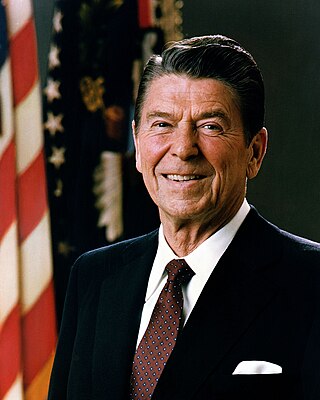
Ronald Wilson Reagan was an American politician and actor who served as the 40th president of the United States from 1981 to 1989. He previously served as the 33rd governor of California from 1967 to 1975 and as president of the Screen Actors Guild from 1947 to 1952 and from 1959 until 1960.

The 1984 United States presidential election was the 50th quadrennial presidential election held on Tuesday, November 6, 1984. Incumbent Republican president Ronald Reagan defeated Democratic former vice president Walter Mondale in a landslide victory.

Edwin Meese III is an American attorney, law professor, author and member of the Republican Party who served in official capacities within the Ronald Reagan gubernatorial administration (1967–1974), the Reagan presidential transition team (1980–81) and the Reagan administration (1981–1985). Following the 1984 election, he was considered for the position of White House Chief of Staff by President Reagan, but James Baker was chosen instead. Meese eventually rose to hold the position of the 75th United States Attorney General (1985–1988), a position from which he resigned following the Wedtech scandal.

Jesse Marvin Unruh, also known as Big Daddy Unruh, was an American politician who served as speaker of the California State Assembly and as the California State Treasurer.
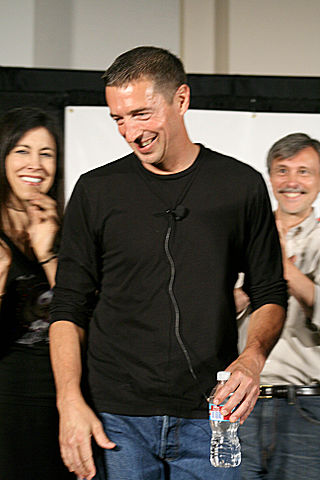
Ronald Prescott Reagan is an American political commentator and broadcaster. Reagan is a former radio host and political analyst for KIRO and Air America Radio, and hosted his own daily three-hour show there. He has also been a contributor to MSNBC. His liberal views contrast with those of his conservative father, President Ronald Reagan.
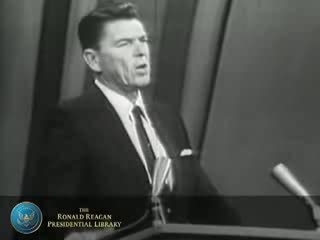
"A Time for Choosing", also known as "The Speech", was a speech presented during the 1964 U.S. presidential election campaign by future president Ronald Reagan on behalf of Republican candidate Barry Goldwater. 'A Time For Choosing' launched Reagan into national prominence in politics.
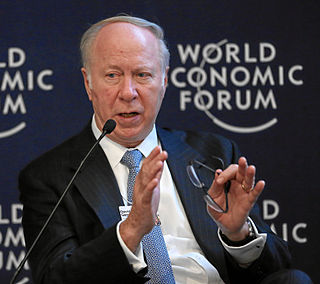
David Richmond Gergen is an American political commentator and former presidential adviser who served during the administrations of Richard Nixon, Gerald Ford, Ronald Reagan, and Bill Clinton. He is currently a senior political analyst for CNN and a professor of public service and the founding director of the Center for Public Leadership at the Harvard Kennedy School. Gergen is also the former editor at large of U.S. News & World Report and a contributor to CNN.com and Parade Magazine. He has twice been a member of election coverage teams that won Peabody awards—in 1988 with MacNeil–Lehrer, and in 2008 with CNN.

On June 5, 2004, Ronald Reagan, the 40th president of the United States, died after having Alzheimer's disease for nearly a decade. Reagan was the first former U.S. president to die in 10 years since Richard Nixon in 1994. At the age of 93 years, 120 days, Reagan was the longest-lived U.S. president in history at the time of his death, a record which was surpassed by Gerald Ford on November 12, 2006. His seven-day state funeral followed. After Reagan's death, his body was taken from his Bel Air home to the Kingsley and Gates Funeral Home in Santa Monica, California, to prepare the body for burial. On June 7, Reagan's casket was transported by hearse and displayed at the Ronald Reagan Presidential Library in Simi Valley, California, then flown to Washington, D.C., on June 9 for a service, public viewing and tributes at the U.S. Capitol.

California Proposition 6, informally known as the Briggs Initiative, was a ballot initiative put to a referendum on the California state ballot in the November 7, 1978 election. It was sponsored by John Briggs, a conservative state legislator from Orange County. The failed initiative sought to ban gays and lesbians from working in California's public schools.

The 1966 California gubernatorial election was held on November 8, 1966. The election was a contest primarily between incumbent governor Pat Brown and former actor Ronald Reagan, who mobilized conservative voters and defeated Brown in a landslide. As of the 2022 gubernatorial election, this is the last time an incumbent Governor of California lost re-election.

Michael Keith Deaver was a member of President Ronald Reagan's White House staff serving as White House Deputy Chief of Staff under James Baker III and Donald Regan from January 1981 until May 1985.

The Ronald Reagan Boyhood Home is the house located at 816 S. Hennepin Ave., Dixon, Illinois, in which the 40th President of the United States Ronald Reagan lived as a youth beginning in 1920. The building was listed on the National Register of Historic Places in 1982. The home is open to visitors from April to October.
The bibliography of Ronald Reagan includes numerous books and articles about Ronald Reagan. According to J. David Woodard, a political science professor, more than 11,000 books on Reagan have been published.
Ronald Reagan was the 40th President of the United States (1981–1989). A Republican and former actor and governor of California, he energized the conservative movement in the United States from 1964. His basic foreign policy was to equal and surpass the Soviet Union in military strength, and put it on the road to what he called "the ash heap of history". By 1985, he began to cooperate closely with Soviet leader Mikhail Gorbachev–they even became friends–and negotiated large-scale disarmament projects. The Cold War was fading away and suddenly ended as the Soviets lost control of Eastern Europe almost overnight in October 1989, nine months after Reagan was replaced in the White House by his vice president George H. W. Bush, who was following Reagan's policies. The Dissolution of the Soviet Union took place in December 1991. In terms of the Reagan doctrine, he promoted military, financial, and diplomatic support for anti-Communist insurgencies in Afghanistan, Nicaragua, and numerous other countries. For the most part, local communist power collapsed when the Soviet Union collapsed.
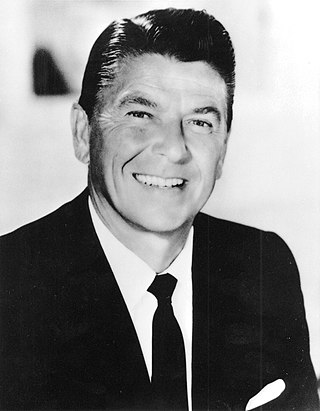
Ronald Reagan was the 33rd governor of California for two terms, the first beginning in 1967 and the second in 1971. He left office in 1975, declining to run for a third term. Robert Finch, Edwin Reinecke and John L. Harmer served as lieutenant governors over the course of his governorship.

The speeches and debates of Ronald Reagan comprise the seminal oratory of the 40th President of the United States. Reagan began his career in Iowa as a radio broadcaster. In 1937, he moved to Los Angeles where he started acting, first in films and later television. After delivering a stirring speech in support of Barry Goldwater's presidential candidacy in 1964, he was persuaded to seek the California governorship, winning two years later and again in 1970. In 1980, as the Republican nominee for president of the United States, he defeated incumbent Jimmy Carter. He was reelected in a landslide in 1984, proclaiming that it was "Morning in America". Reagan left office in 1989.
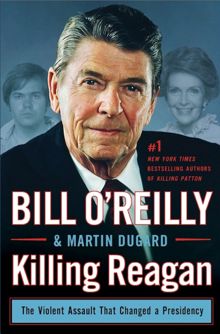
Killing Reagan: The Violent Assault That Changed a Presidency is a book written by Bill O'Reilly and Martin Dugard about the attempted assassination of U.S. President Ronald Reagan in 1981. It is the fifth in the Killing series, following Killing Lincoln, Killing Kennedy, Killing Jesus, and Killing Patton. The book was released on September 22, 2015, and topped The New York Times Best Sellers List.
Rap Master Ronnie is the name of several musical comedies developed by Garry Trudeau and Elizabeth Swados throughout the 1980s, including a 1984 off-Broadway "partisan revue," a music video, and a made for TV movie starring The Smothers Brothers, Carol Kane, and Jon Cryer. The shows all share the same basic structure of a faux campaign ad for Ronald Reagan, satirizing his social policies, particularly those regarding drugs and minorities. The shows received largely mixed reviews.
Ronald Reagan announced his candidacy for President of the United States on November 20, 1975. He won primaries in several states, but eventually lost the nomination to incumbent president Gerald Ford at the 1976 Republican National Convention. If Reagan had won the Republican nomination, it would have been the first time since 1968 that an incumbent president was not nominated by his party.















